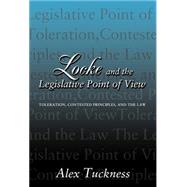
Note: Supplemental materials are not guaranteed with Rental or Used book purchases.
Purchase Benefits
What is included with this book?
| Acknowledgments | p. xi |
| Abbreviated References | p. xiii |
| Introduction | p. 1 |
| The Legislative Point of View and the Ends of Government | p. 15 |
| Contested Laws and Principles | p. 17 |
| Contested Principles and the Legislative Point of View | p. 25 |
| The Analogy between Laws and Moral Principles | p. 31 |
| Contested Principles and the Legislative Point of View | p. 36 |
| Rule-Utilitarianism and Contested Principles | p. 36 |
| Locke, Proast, and Contested Principles | p. 39 |
| The Secular Analogue of the Lockean Argument | p. 46 |
| Two Illustrations | p. 51 |
| Legislative Consent and the Public Good | p. 57 |
| Problems with Contractual Consent | p. 66 |
| Locke's Legislative Consent and the Public Good | p. 74 |
| Beyond Neutrality and Perfectionism | p. 85 |
| Two Liberal Approaches | p. 85 |
| Rawls and Reasonable Agreement | p. 88 |
| Raz and Human Well-Being | p. 101 |
| Beyond Neutrality and Perfectionism | p. 110 |
| The Legislative Point of View and Constitutional Roles | p. 115 |
| Institutional Roles and the Legislative Point of View | p. 117 |
| Locke on Legislative and Executive Powers | p. 121 |
| Locke and the Missing Judicial Power | p. 127 |
| Judges as Legislators: Functions versus Institutions | p. 132 |
| Implications for Contested Roles | p. 135 |
| Contested Roles, Interpretation, and the Framer's Point of View | p. 137 |
| Contested Jurisdiction and the "Framer's Point of View" | p. 140 |
| Contested Constitutional Jurisdiction in the United States | p. 143 |
| Dworkin and the Legislative Point of View | p. 147 |
| Originalism and the Nature of Law and Legislation | p. 159 |
| Boerne v. Flores | p. 166 |
| Contested Roles and the State of Nature | p. 172 |
| Conclusion | p. 174 |
| Textual Support for the Legislative Point of View | p. 179 |
| Locke's Theory of Consent and the Ends of Government | p. 181 |
| Bibliography | p. 191 |
| Court Cases Cited | p. 199 |
| Index | p. 201 |
| Table of Contents provided by Publisher. All Rights Reserved. |
The New copy of this book will include any supplemental materials advertised. Please check the title of the book to determine if it should include any access cards, study guides, lab manuals, CDs, etc.
The Used, Rental and eBook copies of this book are not guaranteed to include any supplemental materials. Typically, only the book itself is included. This is true even if the title states it includes any access cards, study guides, lab manuals, CDs, etc.